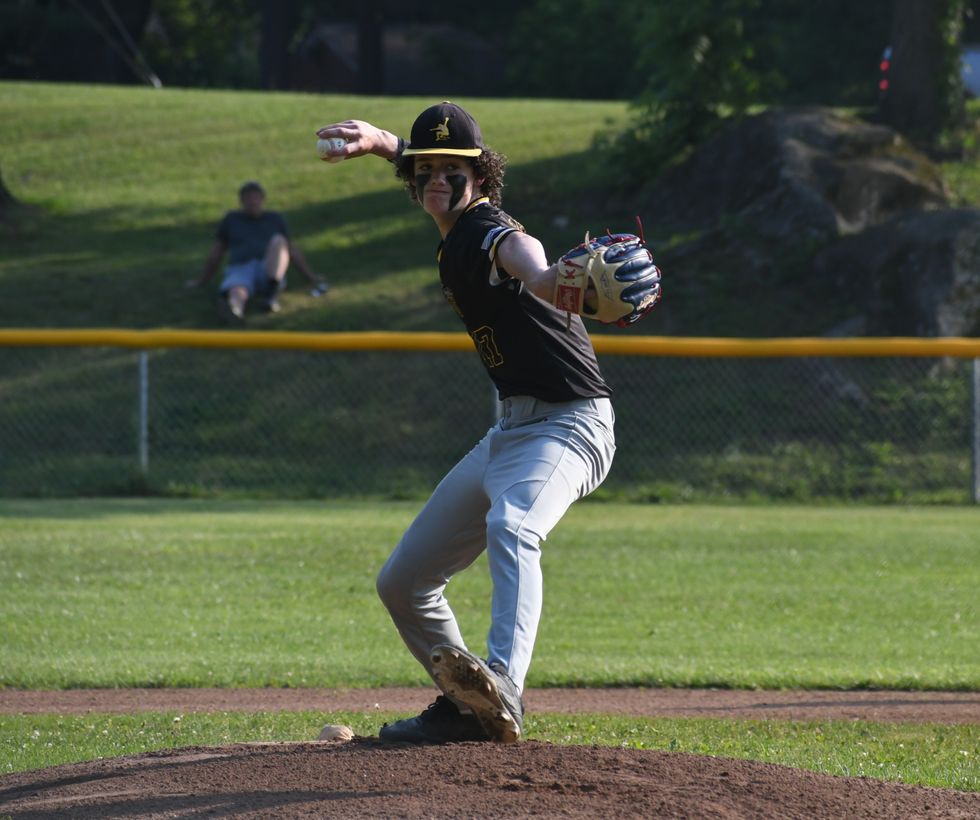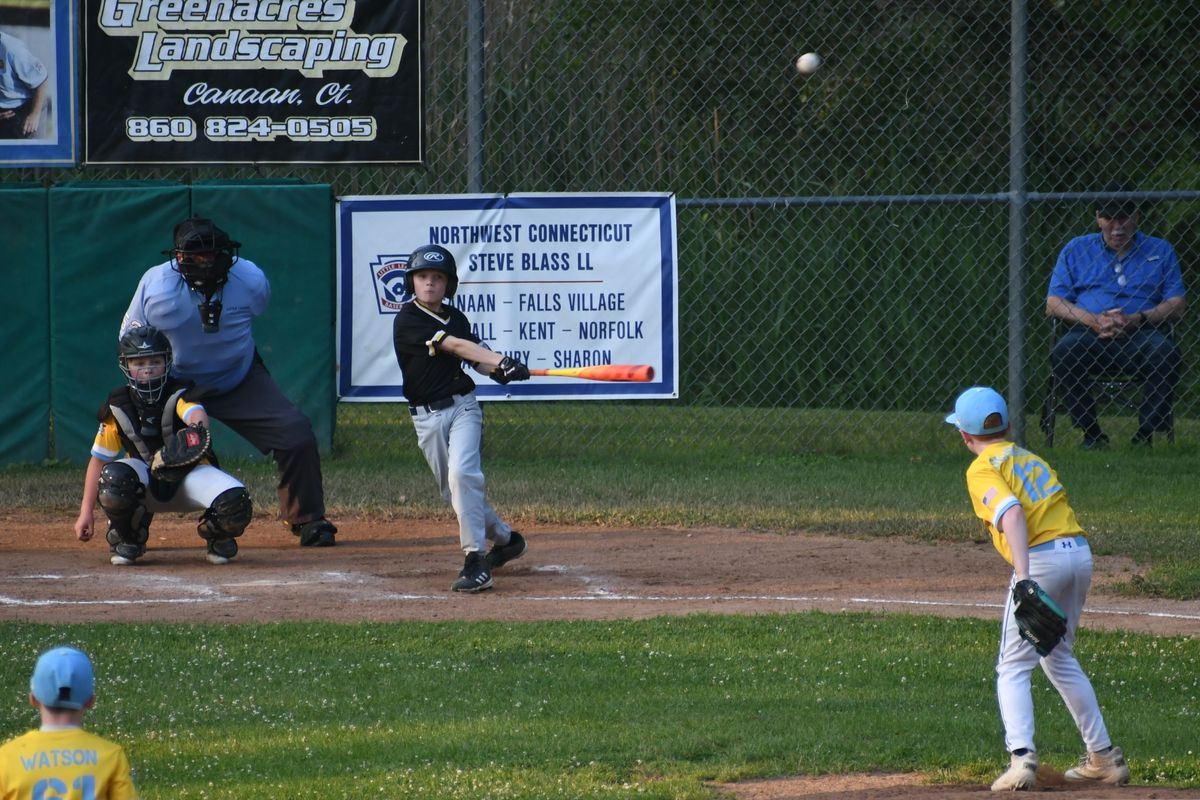Latest News
Milo Ellison sends a fly ball to left field, bringing home Brody Ohler and Sam Hahn in a walk-off win for the Canaan Pirates June 11.
Photo by Riley Klein
NORTH CANAAN — The Canaan Pirates advanced to the league championship after a comeback victory over the Tri-Town Red Sox Wednesday, June 11.
Down 3-2 with two outs and two on in the bottom of the 6th inning, "Mighty" Milo Ellison stepped up to the plate and launched a fly ball deep to left field. The single brought home Brody Ohler and Sam Hahn for a walk-off Pirates win.
"Milo did it," shouted a teammate. "Let's hear it for Milo!"
Elite pitching from both sides kept the game close. Starter Sam Hahn pitched five and one-third innings for the Pirates and recorded 10 strikeouts. For the Red Sox, Joey B. struck out 11 batters over five innings.

Milo Ellison led the Pirates offensively, batting 2-for-3 with one run and three RBI. Sam Norbit logged an RBI and went 1-for-2 at the plate for Canaan.
"Nothing like a walk-off," said a spectator after the Pirates won 4-3.
Canaan, which includes players aged 10-12 from the six Region One towns and Norfolk, will face top-ranked JRC Transportation in the Northwest Connecticut District 6 Little League title game.

The Pirates are the reigning champs of District 6 and have a 10-2 record this season. Brody Ohler, who pitched the win in last year's championship, is expected to start on the mound once again for Canaan.
JRC Transportation led the league this season with a record of 11-1. Canaan delivered JRC its lone loss 1-0 on May 27, but JRC defeated Canaan 15-4 in the June 6 rematch.
The championship will be played at Reeves Field in Thomaston Friday, June 13, at 6 p.m.

Keep ReadingShow less
Kevin Kelly’s After Hours
Jun 11, 2025
Kevin Kelly
Photo by Christopher Delarosa
“I was exposed to that cutthroat, ‘Yes, chef’ culture. It’s not for me. I don’t want anyone apologizing for who they are or what they love.”— Kevin Kelly
Kevin Kelly doesn’t call himself a chef; he prefers “cook.” His business, After Hours, based in Great Barrington, operates as what Kelly calls “a restaurant without a home,” a pop-up dining concept that prioritizes collaboration over competition, flexibility over permanence, and accessibility over exclusivity.
Kelly grew up in Great Barrington and has roots in the Southern Berkshires that go back ten generations. He began working in restaurants at age 14. “I started at Allium and was hooked right off the bat,” he said. He worked across the region from Cantina 229 in New Marlborough to The Old Inn on the Green at Jacob’s Pillow before heading to Babson College in Boston to study business. After a few years in Boston kitchens, he returned home to open a restaurant. But the math didn’t work. “The traditional model just didn’t feel financially sustainable,” he said. “So, I took a step back and asked, ‘If that doesn’t work, then what does?’”
The answer became After Hours. Rather than investing in a single location, Kelly partners with various venues and brings the restaurant experience to them. He uses the commercial kitchen at The Thornewood, a former inn turned workforce housing in Great Barrington. “They didn’t really have much use for the commercial kitchen, and I happened to connect with them when they acquired the property. We were actually the first tenant in the building,” said Kelly. Events are usually family-style and rooted in seasonal, local ingredients, sourced from local farms whenever possible including Dancing Greens, Indian Line, Off The Shelf and North Plain.
Since launching in December 2023, After Hours has hosted more than 150 events and partnered with nearly 100 local businesses including Wards Nursery in Great Barrington, Paige’s Place in Otis, Massachusetts, The Berkshire Botanical Garden, and coming up is a summer residency at The White Hart in Salisbury. From multi-course dinners to casual market pop-ups, its model adapts to the space, the moment, and the ingredients. “We design menus based on the venue,” said Kelly. “Whatever the kitchen allows, we make it work.”
Looking for partnerships that are mutually beneficial adds to the community-oriented business model. “Something we always look to curate with events and event partners is finding ways to mutually collaborate on marketing. So, Wards is a great example where they’re really looking to tap into a younger demographic and that’s something we’re able to really bring to the table.”
Now, Kelly is extending the model with a new initiative called The After Hours Supper Club. A subscription-based model, members will receive monthly meals for two or four with seasonally inspired mains, small plates, desserts, and extras. A portion of the proceeds supports Berkshire Bounty, a nonprofit fighting local food insecurity.
The Supper Club is not Kelly’s first collaboration with Berkshire Bounty. Last Thanksgiving, he launched a “buy one, give one” meal kit where one purchased meal equaled one donated to a local family. “Berkshire Bounty is so grateful for the continued support from Kevin and After Hours. Through Kevin’s creativity and care, together we are making an impact on food security in this community and providing nourishing food for the most vulnerable among us,” said Morgan Ovitsky, Executive Director of Berkshire Bounty.The subscription model allows After Hours to extend its reach into homes across the region. “We’ve had strong early interest,” said Kelly. “We’re fulfilling our first orders in June.”
Staffing such a fluid operation is a challenge. To address this, Kelly also created After Hours Gigs, a flexible labor system where people can sign up for one-off shifts. “Most people around here have three or four jobs,” he said. “This lets them pick up a gig with low commitment.” About 15 to 20 people work regularly through the system, but Kelly is often still scrambling to fill roles on busy weekends. With five events in just four days on the calendar, Kelly keeps moving. “It’s a lot,” he said. “But you just do it. One event at a time.”
There is a distinctly anti-macho ethos to his kitchens. “I was exposed to that cutthroat, ‘Yes, chef’ culture. It’s not for me. I don’t want anyone apologizing for who they are or what they love.” When someone asks what to wear to a gig, his response is simple. “Be comfortable. Be presentable. Be yourself.”
What Kelly has built with After Hours is less a brand than a belief that food should be personal, shared, grounded in place and people. So, what’s the most delicious thing he’s made recently? “A white pizza with ramp pesto,” he told me, eyes lighting up. “We’ve started doing Sicilian slices at the farmer’s market. Breakfast pizzas are next.”
For more information, visit: www.afterhoursgb.com
Keep ReadingShow less
Books & Blooms’ tenth anniversary
Jun 11, 2025
Dee Salomon on what makes a garden a garden.
hoto by Ngoc Minh Ngo for Architectural Digest
On June 20 and 21, the Cornwall Library will celebrate its 10th anniversary of Books & Blooms, the two-day celebration of gardens, art, and the rural beauty of Cornwall. This beloved annual benefit features a talk, reception, art exhibit, and self-guided tours of four extraordinary local gardens.
The first Library sponsored garden tour was in June 2010 and featured a talk by Page Dickey, an avid gardener and author. This year’s Books & Blooms will coincide with Ellen Moon’s exhibit “Thinking About Gardens,” a collection of watercolors capturing the quiet spirit of Cornwall’s private gardens. Moon, a weekly storyteller to the first grade at Cornwall Consolidated School and art curator for The Cornwall Library, paints en plein air. Her work investigates what constitutes a garden. In the description of the show, she writes: “there are many sorts...formal, botanical, cottage, vegetable, herb...even a path through the woods is a kind of garden. My current working definition of a garden is a human intervention in the landscape to enhance human appreciation of the landscape.” Also on display are two of her hand-embroidered jackets. One depicts spring’s flowering trees and pollinators. The other, a kimono, was inspired by Yeats’s “The Song of the Wandering Aengus.”
On Friday, June 20 at 5:30 p.m. writer and garden philosopher Dee Salomon will give a talk titled, “What Makes a Garden a Garden?” at Cornwall Town Hall. Beloved for her “Ungardener” column here in our newspapers, Salomon will reflect on the meaning of gardens and their place in the human imagination. The presentation is followed by a festive cocktail reception at the library, with live music by the Crownback Funk Trio, an improvisational blend of funk, blues, and jazz.
Then on Saturday, participants can enjoy self-guided tours of four distinctive Cornwall gardens, each with docents on hand to answer questions. From a terraced Italianate hillside overlooking the Housatonic River to a wild deer-frequented garden brimming with perennials and daffodils, these gardens tell stories of transformation, imagination, and place.
Books & Blooms is a reflection of the Cornwall Library’s vital role in town. “The library really is the central meeting place,” said event organizer Kirk Van Tassel. “People come here for talks, kids’ programs, art exhibits. It’s a cornerstone of community life.”
To purchase tickets, visit cornwalllibrary.org
Keep ReadingShow less
loading


















